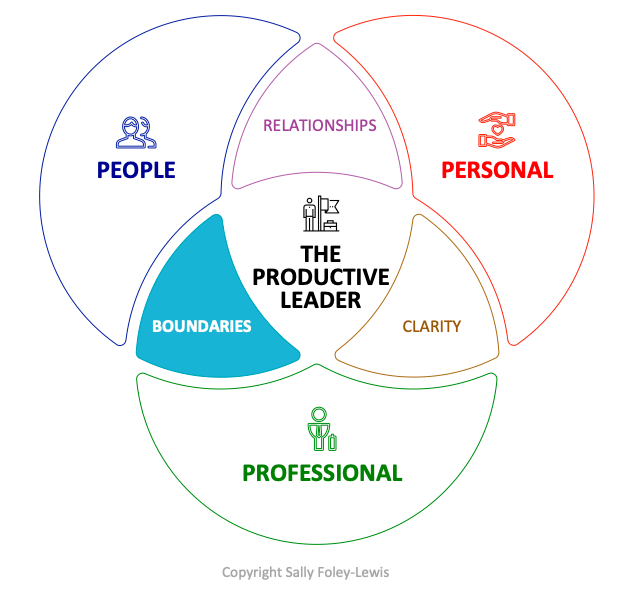Boundaries help you say yes to the right opportunities and to avoid the potentially wasteful or costly pitfalls.
Understanding and applying boundaries no matter where you might sit in the organisational chart or what power or authority you have, means you can be more productive doing the right work at the right time to get the right results.
BOUNDARIES PROTECT PRODUCTIVITY
They protect time and effort because they ensure your focus is not encroached upon at the wrong time. Boundaries are in place to inform the right behaviour and help correct the wrong behaviours. Burnout is a big consequence of not having clear and enforced boundaries and research shows that 32% of people say or have reported that they have an unreasonable workload, and another 32% say they do too much over time or after hours work. These directly lead to burnout and that’s because boundaries aren’t in place or are too loosely held.
It’s not always easy to say no. In some situations it could be that you don’t even realise that your boundaries are either too flimsy or too strict. It might be you’ve never even thought you could have boundaries, or that setting boundaries might reflect badly on you. Not so: clear and reasonable boundaries show confidence, let others know how to treat you, and help you get your work done. They can also show your team, employees and colleagues how to deal with each other.
If someone asks you to do something and you can hear the voice in your head say, “I should say no.”, but you do it anyway, chances are your boundaries are too weak. If you say yes, and then resent the fact that you’re doing the task, then that too may mean a weak boundary.
When your boundaries are too weak, and you (inadvertently) let others take advantage of you, that sends a message to others that they too can do the same. You are giving them permission.
If you disclose some information about yourself and then think about it later and feel like you’ve been vulnerable or you feel anxious, because you’ve disclosed that, that too is about not having a clear boundary for yourself. The same fits if you share information that makes others feel uncomfortable and you’re not aware that the other person is uncomfortable. This means you need to have a look at how loose or weak your boundaries might be.
The very obvious one is when people take advantage of you. If colleagues, managers, even friends, let you get the coffee almost everyday or you’re the one who goes and makes the cups of tea without them stepping in and offering to make or pay, albeit a simple example, might mean you’re being taken advantage of. Even if you say you’re happy to do it, at some point when will the gesture be repaid? Ask yourself: are your boundaries too weak?
Conversely, you may have created too strict or tight boundaries if:
- you feel like no one knows you or understands you.
- people would describe you as someone who plays their cards close to your chest.
- you feel like you can’t relate to others.
- you often dismiss other’s attempts to share with you, such as things going on in their lives.
- you’ve even stopped someone in their tracks from sharing something happy or sharing whatever is going on with them, and it might even be work related, not anything personal.
- people stop calling you and people stop inviting you to functions and events, even if they’re professional networking events.
- you enjoy all the work that you do, but it does not include anyone else.
When it comes to understanding boundaries, if you’ve never taken any notice, or worked on them before, it can feel quite uncomfortable, and it’s probably quite normal to expect a little bit of resistance, including from others around you. It’s a new thing to step into boundary setting and boundaries sit at the intersection of the work you do and the people that you work with, so it makes sense to have boundaries but it also makes sense that if you make changes to your boundaries there’ll be a period of adjustment for you both.
You need to have boundaries around behaviours, boundaries around the activities and tasks you do, and boundaries around your relationships at work and home.
Boundaries are like fences and houses. Sometimes the gates and garage are closed and the front door and back door is locked and no one can get in.

Where as other times, there’s no fence, the garage door is open, the front door is open, and while that allows some fresh air to come through, it can also allow others to pass through. Too open and it allows people to take advantage, to steal your belongings.

The saying that fences make great neighbours, works well here. boundaries are like fences and gates and you do get to control them. It may not feel like you do sometimes, but you do and you need to. When you step into having those boundaries in place, then you are empowered and it means you get to take more control of your productivity.
Years ago I worked for a training company and if I weren’t in the training room, I’d be at home designing and creating the training materials. Although it was a ‘part-time’ job I know I worked full time hours at least because I loved what I was doing. One afternoon my husband came to me and said, “Are you going to have a day off soon?” I replied, “What do you mean, I have time off all the time?” In my mind, I didn’t work a constant nine to five at my desk at home, some days were long, some days were short. To me, I had breaks all the time, but my husband said, “You’ve been working 63 days straight.” I didn’t realise it and it made me feel quite guilty when I realised I hadn’t had any time off with him. I had let go of one of my boundaries. I had let the demand for the work, and my enjoyment in the work creep in and take over other important parts of my life. Without realising I had challenged some of my values.
To set your boundaries, you need to know your values. You need to understand what’s important to you and therefore what systems are going to come into play to support your boundaries and your values. You need to communicate clearly what it is you will and won’t do. You really do have to be explicit and tell people. Don’t assume people can work it out from your behaviour.
You need to understand what is urgent and what is important for you and your productivity. You may also have to determine when and how you will step up and help with other people’s urgent or important.
Are you clear about the hours you will work and do you role model this to others. By you working really long hours day in day out you show you have too loose boundaries about hours of work and you may also be sending a message to others that that’s what’s expected. That’s not productive, healthy or sustainable.
In the same training company I worked at our office manager got to a point where she turned her mobile/cell phone off at 7:00 p.m. because the managing director would be calling her at all hours, as late at 10:30pm sometimes. Beside the fact that she had a family to spend time with, she was not paid to be on call 24/7. She informed the managing director of her boundary and told him she would not take calls after 7:00pm. To reinforce that boundary the phone was switched off at 07:00 p.m. Did that backfire, rarely. The reality was it stopped the managing director. It was a clear boundary. It was effective.
Be okay with discussing boundaries if someone crosses yours. Talk about it straight away. If someone walks into your house without your permission, you’d have a few select things to say, no doubt. You’d handle the matter immediately. The difference in the case of someone challenging or pushing your boundaries is how you discuss it. In a clam and respectful manner, you can seek to understand what the person wanted to achieve. As Stephen Covey’s fifth habit* states “seek to understand then to be understood”. Give the person the benefit of doubt that they may not realise you had a boundary in place.
1. What if someone keeps telling sexist or racist jokes?
2. What if someone constantly gossips about others?
3. What if someone constantly speculates about change just to stir up drama?
…. Clearly and politely in the moment say …
1. “Everyone loves a good laugh, jokes are great however sexist and/or racist jokes are not funny.”
2. “We really shouldn’t be talking about that person, if you want to talk about them then they should be here to be part of that conversation, otherwise it’s gossip. I don’t want you to get a reputation as the office gossip.”
3. “That’s interesting, is it a fact or are you speculating? Who should we ask to get it verified?”
Seek to understand then to be understood.
.If someone is disclosing information about something that shouldn’t be disclosed then you can do a blend of statement-question by politely saying, “I’m not too sure if I’m meant to know that information. Is it public knowledge? It might be best not to continue telling me anything in case you’re inadvertently breaching a policy, rule or confidence.”
To be clear, this is not about you whinging or complaining. It is framing your explanations (a.k.a. boundaries) so that they’re quite clear and it means people then don’t breach them.
If your boss makes an unreasonable request, as you already know, seek to understand then to be understood: clarify what the request is about and then determine your next steps. For example, with a respectful tone: “To know that I understand more clearly what you’re asking for can you tell me some background and why you need this done now?”
Seek clarifications and then help them or put forward your concrete boundary explanation. It might also be in your best interest to help the person find alternatives other than you. You can be helpful without bruising your boundaries!
If the task dents your boundary yet you’re prepared to help, it will be worth it to let the person know you’ll help them this time but you need to find some alternative strategies if it’s ongoing. If you let it continue, you are only going to resent the person for asking and yourself for letting your boundary be breached.
Not everyone you work with or meet is going to know what your exact boundaries are. If you get asked to do something, say someone emails you on the weekend, what are you going to do?
– Reply straight away?
– Respond on Monday (or first day back at work) explaining you are on your weekend?
– Ignore it because you have your out of office switched on for every weekend?
Don’t be naïve, be prepared for violations of your boundaries. To handle them, make sure your emotions are in check before you act. Take the weekend email example, when that email arrives on Saturday afternoon what happens to your emotions the minute you see that email? Where do your thoughts go to? Do you act in a way that your emotions drive an instant response or do you take a breath, think it through, and follow your own protocol around your boundaries? Make sure your actions match your boundaries rather than any heightened emotions that you may later regret.
Building boundaries, just like building a fence, takes time and it actually takes a bit of skill and practice.
When your boundaries get crossed you need to be ready for it, again, don’t be naïve, it will happen. People will try and push your boundaries. It’s in that moment you need to calm yourself – take a few deep breaths – and seek clarification and then help or clearly state your boundary. Help them find a way forward if you’re not the right person.
One of the strategies that worked for me when I was a project officer and I would have lots of people, problems, tasks and opportunities coming and going constantly was to:
- Take three 3/6 breaths, that is, breath in for the count of three then breath out for the count of six. Do this three times. No one could tell I was doing this to calm myself.
- Ask questions to make sure I understood the situation.
- Ask myself what category the request fitted into: Is this:
– Not me?
– Not now?
– Never?
4. Take action by either helping, delegating or explaining my boundary.
Like most things in life, it’s all about balance!
I’d love to know your thoughts…





